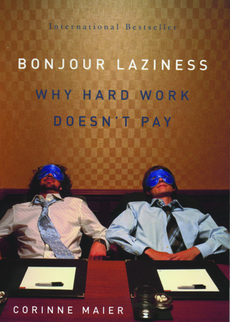In her new book, “Bonjour Laziness,” author Corinne Maier tackles the taboo of corporations with wit and sharp originality that makes her a modern day “Office Space” heroine for our generation. If you hated your job before you’re going to hate it even more after reading the book.
“Bonjour Laziness” takes a hilarious look at modern day corporations breaking down everything that is wrong about big business, from workplace jargon to the non-importance of college degrees, Maier has crafted an interesting book that makes you question what you are really working for and why.
While the book is satirical and manages to hold your attention, Maier, a part time economist (oh the irony in that), has some very leftist ideas about corporate business in general.
Her hate for business resonates so deeply that at one point in the book she mentions how her children will disappoint her if they decide to enter business.
“Darlings, please promise never, ever, to work in business when you grow up, daddy and mommy would be so disappointed!” she gripes. She instead opts that the general public should only be concerned with the arts and such.
Her attack on corporate business should be applauded in most respects but she seems to not give business a fair chance. Every argument she makes is backed by a philosopher of some regard, but only probably once in the entire novel does she use an actual business source as most business people she cites have either cheated, defrauded, or gone bankrupt in the corporate world. I dare ask if it was not for business how would the economy survive?
Maier is a counterculture heroine who is not afraid to speak up for those locked up behind cubicles and suffocating in a 9 to 5 workweek.
Her arguments are impressive. If you’re not familiar with it or haven’t ever been in an office or work force corporate jargon becomes very confusing. “Only Communist regimes have churned out more jargon than modern business,” Maier states.
From there she goes on to describe how business over complicates simple speech, using “bigger” words instead of words that are more accessible, such as “initialize” instead of begin or “finalize” instead finish. She questions using words like maximization and optimization. It makes companies sound more articulate but in reality is as confusing as trying to comprehend a conversation with Boomhauer from “King of the Hill.”
Another interesting argument is how pointless having a diploma or degree is in the work place. Maier believes that having a degree doesn’t necessarily guarantee that you’ll move up in the work place and, like the Jeffersons, get your piece of the pie. She claims that no matter who you are in the corporate world it’s an even playing field, businesses discriminate whether you’re the smartest guy in the room or you’re a total moron. All a business wants according to Maier is someone who can follow a routine and is not inventive or imaginative.
However, according to Maier, if you are in possession of a degree, don’t fret that all the time you spent in school went to waste. At least you’re able to prove to your manager or CEO that you are at least capable of handling an office setting.
“Only a former student who was able to tolerate years of study, the stupidity of his teachers, the pressure of friends to what everyone else is doing, is capable of putting up with the banality and repetitiveness of thirty- odd years in an office,” writes Maier.
“Bonjour Laziness” is the counterculture’s answer to any Enron executive, Donald Trump, or Gordon Gecko (1987 film “Wall Street”) who live for big business. Maier’s book is an enjoyable read that makes you think about what the corporate world is really all about. So before you decide on venturing into the repetitive 9 to 5 work week, you might want to take a gander at “Bonjour Laziness.”

